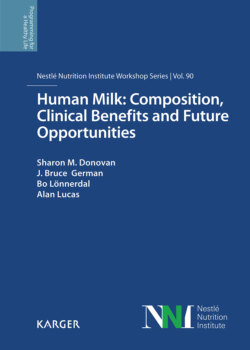Читать книгу Human Milk: Composition, Clinical Benefits and Future Opportunities - Группа авторов - Страница 17
На сайте Литреса книга снята с продажи.
The Benefits of Breastfeeding Revisited
ОглавлениеArguably, the main platform for the global promotion of breastfeeding is the scientific evidence for its clinical benefits. However, with few exceptions, the comparison of breast- and formula-fed babies has not been based on randomized trials that would prove causation, but rather on observational associations.
Initially, the main outcomes of interest were infection and cognition, but these outcomes are potentially highly confounded by the differences in the populations (statistically) that choose to breastfeed or formula feed. As an example, cognitive benefits in breastfed babies have been described in a number of studies since 1929, but in 2006, Der et al. [16] concluded from a meta-analysis and study of sibling pairs that there was no cognitive benefit due to breastfeeding, and the previous positive findings were explained by the higher maternal IQ in those who chose to breastfeed. This study emphasizes the ever-present potential for confounding in epidemiological studies where there are major demographic differences between the groups compared, though the study by Der et al. [16] was also nonrandomized.
Today, a wide variety of beneficial outcomes has been linked beneficially to breastfeeding [17], including CVD and obesity risk, atopic disease, IQ, brain size, infection, cancer, sudden infant death, celiac disease, and type I and II diabetes – but again these beneficial outcomes have only been epidemiologically associated with breastfeeding and not determined experimentally, leaving uncertainty over causation.
The challenge then is how better-quality evidence can be obtained, given the constraint that randomized trials, for instance comparing the outcome of breastfeeding versus formula feeding, are generally precluded on ethical grounds.
